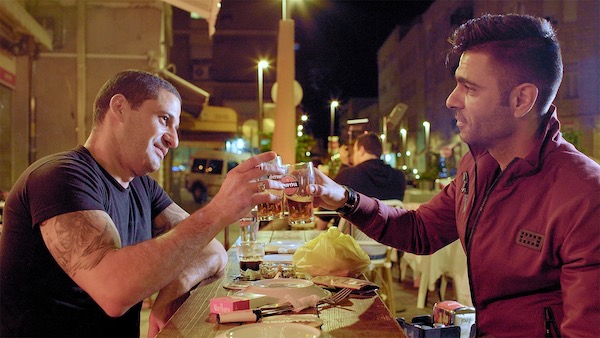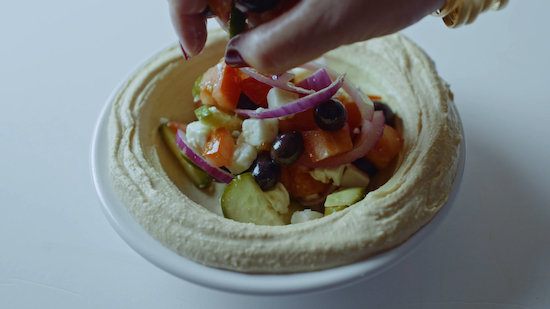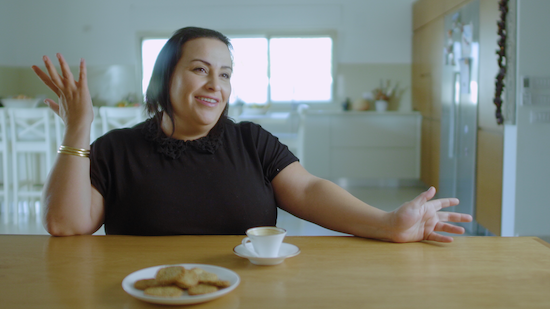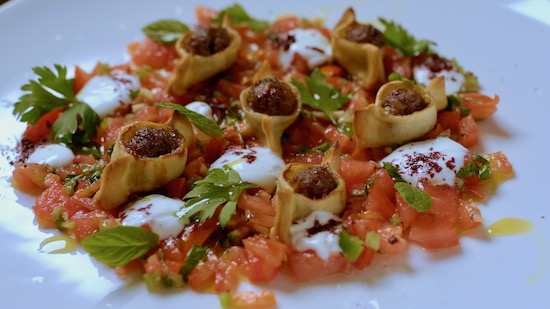Breaking Bread: Let Food Be Thy Medicine

An inspiring and visually delightful film, Beth Elise Hawk’s Breaking Bread features the founder of Israel’s annual A-Sham food Festival, as well as several participants, along with myriad mouth-watering depictions of Mediterranean cuisine. Founded in Haifa in 2015 by Dr. Nof Atamna-Ismaeel, the first Israeli Arab to win Israel’s MasterChef, the festival brings together Arab and Jewish chefs to collaborate on new iterations of Arabic dishes. Foremost a food documentary with some light social commentary, Breaking Bread begins with a quote from Anthony Bourdain: “Food may not be the answer to world peace, but it’s a start.” By the end of this feel-good film, even the most cynical among us may feel optimistic about that claim.
Presiding over the festival is the ever upbeat Atamna-Ismaeel, who declares that being an Israeli Arab is difficult—not completely accepted by either side—but “Stuck in the middle is the best thing because you get to enjoy both worlds.” Her belief that there’s no room for politics in the kitchen is echoed by others throughout the film. The sentiment rings true here, as it does with other creative collaborations, be it music, dance or art.

Hawk introduces us to several chefs who have participated in A-Sham, including the loquacious Shlomi, who took over the Polish-inspired restaurant his grandfather founded; and his festival cooking partner, Ali, manager of a restaurant in his picturesque village on the Israel/Lebanon border. Of Syrian descent, Ali too is upbeat, happy with his life in Israel, as is youthful Osama, from the seaside village of Akko, who talks about the traditional mix of cultures in his town: “I’ve never felt like an outsider.” It’s tempting at first to write off this contentment as an anomaly, given headlines about the region that dominate western media, but in many areas of Israel, life and culture are clearly a lot more complicated and nuanced than what we’re used to hearing about troubled areas like Gaza/West Bank. Breaking Bread often contradicts simplistic ideas that many westerners may have about Arabs living in Israel, many of whom are not Palestinian.

Osama’s partner, Ilan, is another interesting character, a long-haired half-Catholic idealist who is disdainful about politics. The final pair we get to know, Tomer and Saleh, are also male, which leads us to wonder if Atamna-Ismaeel, the daughter of a doctor and herself a microbiologist, is something of an aberration. Along with several of the other Arabic chefs, she expresses happiness about sharing their food with Israeli society, a form of representation and legitimization. She believes that people have been brainwashed by negative media headlines about tensions between Arabs and Jews, and that A-sham never has never gotten the media coverage it deserved because it was a positive story.
The festival is very much a product of Haifa, a multicultural city whose mayor boasts about celebrating Ramadan, Christmas and Hanukkah. Some sensitivities are touched upon, including the fact that much Israeli food is based on traditional Arabic dishes, which, according to Atamna-Ismaeel, can be a tricky issue. “It’s funny, sad, and complicated,” she admits of the casual appropriation.

The festival itself is finally shown, albeit quickly, but the film is really about the meeting of chefs from different sides of the “fence” and the melding of Arab/Muslim and Israeli/Jewish cuisines and traditions. The chefs depicted here seem to enjoy each others’ company, bonding over their love for cooking and its importance in their lives.
Breaking Bread is not a film that delves deeply into politics or conflicts of the area, but focuses on the joys of sharing food and the colorful, inventive cuisine of the area formerly known as the Levant. As Tomer notes, “If you cook for somebody and he eats your food, that’s where politics ends.” It’s hard to argue with that. And it’s nearly impossible to leave this film without intense cravings for the beautiful food shown so lovingly prepared and appreciated.
Breaking Bread opens on Friday, February 4, in New York (Quad Cinema & JCC Manhattan).
— Marina Zogbi

